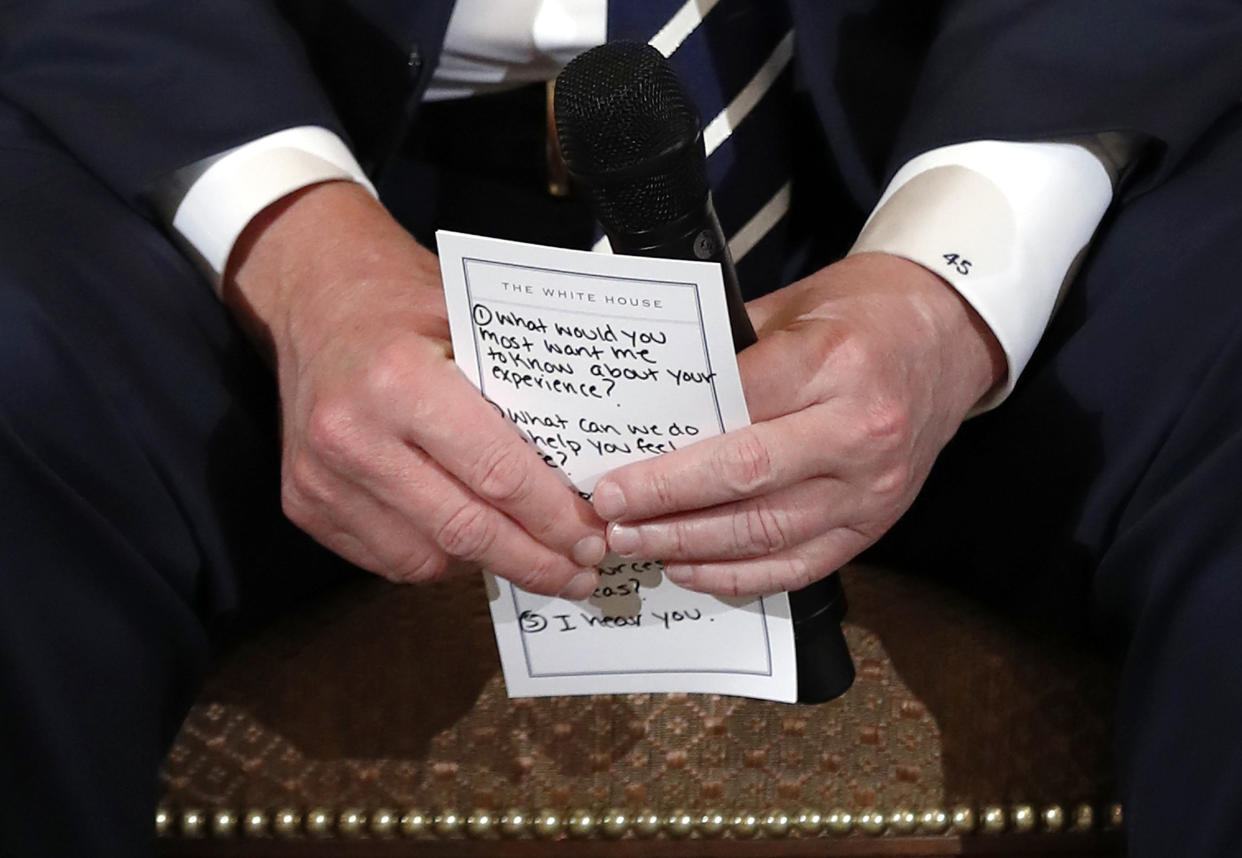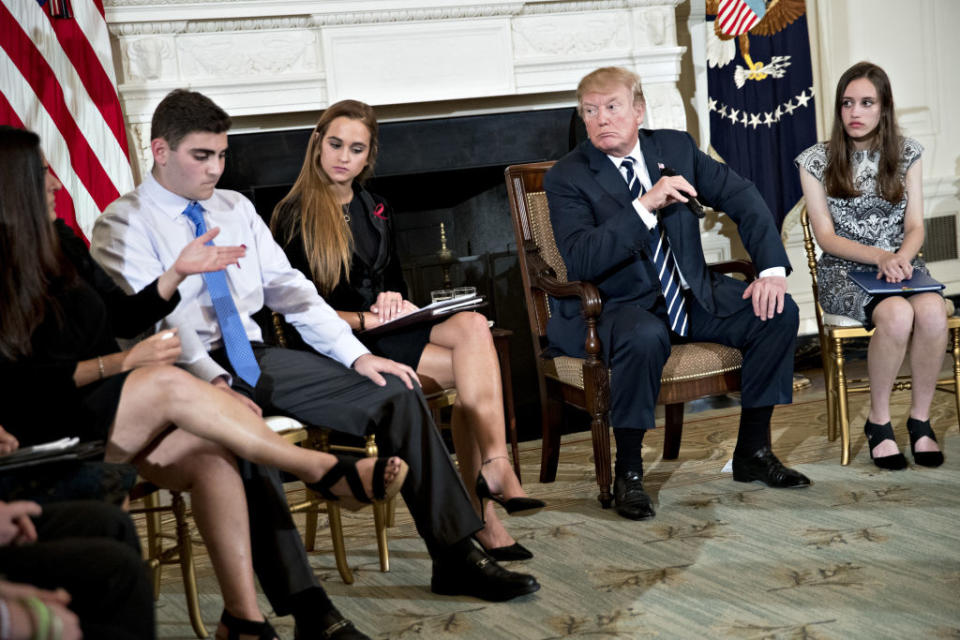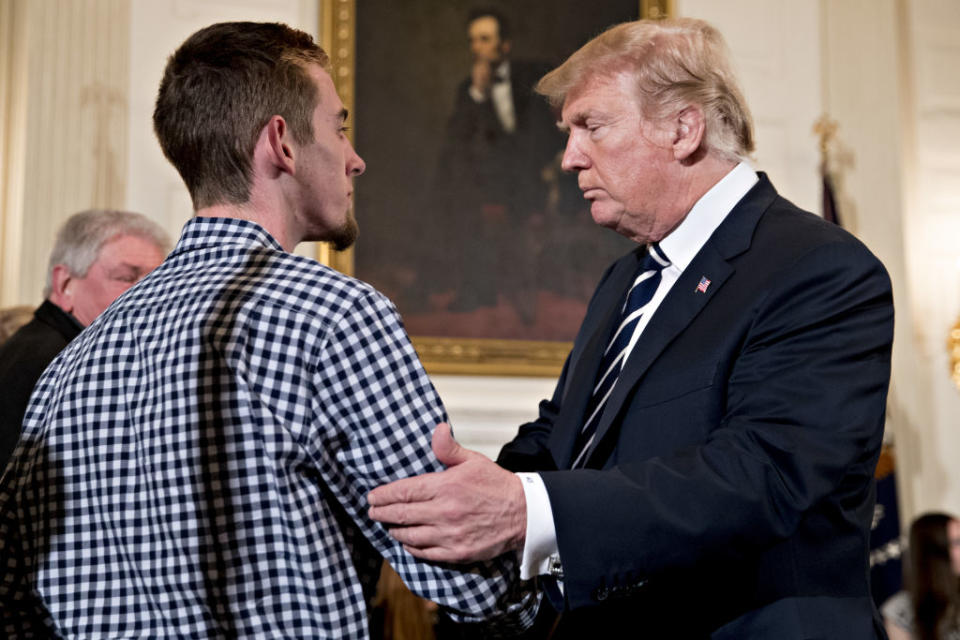Trump didn't say 'I hear you' to shooting survivors — but maybe he should have

On Wednesday, President Trump met at the White House with students and families affected by shootings at schools, including Marjory Stoneman Douglas High School. The overall goal was to discuss what can be done to prevent school shootings in the future. Eagle-eyed photographers, meanwhile, noticed that the president was holding a briefing note containing prompts for talking points during the session.
The note included reminders to ask the questions “What would you most want me to know about your experience?” and “What can we do to make you feel safe?” and to ask survivors for resources they may need and ideas they had, per the Guardian. But the final note, and the one getting the most media attention, seems to be a prompt on what the president should say to convey sympathy to families: simply, “I hear you.”
Trump didn’t actually use any of the questions or phrases that were on the card during the meeting, “I hear you” included, but he did thank everyone who attended the session. “Thank you for pouring out your hearts,” he said. “The world is watching, and we’re going to come up with a solution.”

While Trump didn’t say “I hear you,” the phrase can be powerful when used appropriately. “Most people don’t feel heard,” David Klow, licensed marriage and family therapist, founder of Chicago’s Skylight Counseling Center, and author of the book You Are Not Crazy: Letters From Your Therapist, tells Yahoo Lifestyle. “Perhaps they feel like others sometimes listen, but often they feel like others are not really hearing what they are saying.” That’s why sometimes a simple “I hear you” can go a long way.
“‘I hear you’ can convey that you’re actually listening to what someone says, you’re really taking it in, and really considering it,” Gail Saltz, MD, a psychiatrist and the author of The Power of Different: The Link Between Disorder and Genius, tells Yahoo Lifestyle. It may even imply that you’re going to respond to it in some way. “That is really important in just about any valued relationship,” she says. “It implies empathy and the ability to listen.”
But intention matters, too. “The phrase ‘I hear you’ is not as important as the genuine intent of a person to listen to the pain of the other person and listen with empathy,” clinical psychologist John Mayer, author of Family Fit: Find Your Balance in Life, tells Yahoo Lifestyle. When the phrase is overused, it can actually accomplish the opposite: It can show a lack of empathy, he says.
Saltz agrees. “Saying ‘I hear you’ repeatedly and not actually listening or doing anything to help can make someone come across as untrustworthy,” she warns.
If you are, in fact, able to listen to someone’s pain, it can make them feel like they’re not alone, Mayer says. “Empathic listening,” i.e., listening and responding to the person in a way that establishes understanding and trust, is a “powerful healing tool,” Mayer says.

That’s especially true when it comes from a parent or other person in a position of authority. “It is soothing, because they are seen as figures that can make a difference in your pain,” Mayer says. Authentic listening by people who are in positions of power can also cause “tremendous healing” for people who are suffering, Klow says.
If you want to use this phrase in your life, Mayer recommends that you do so genuinely. If you don’t feel that it’s right for a particular situation and you still want to convey comfort, he suggests saying something more like, “I can’t imagine what you are feeling right now, but I can feel your pain and I’m here for you.” Ultimately, making someone feel heard and appreciated when they’re struggling can go further than any catchphrase.
Read more from Yahoo Lifestyle:
Why men are gaslighting this celeb for suggesting ‘boys are broken’ in the wake of Florida shootings
An Alabama representative is proposing a law to arm teachers. Here’s why that’s a deadly idea.
Follow us on Instagram, Facebook, and Twitter for nonstop inspiration delivered fresh to your feed, every day.
